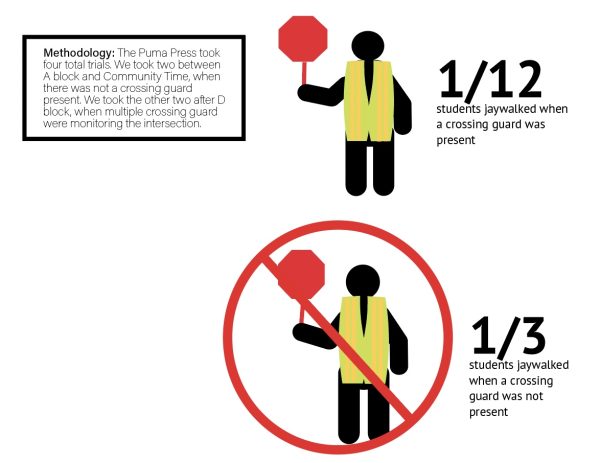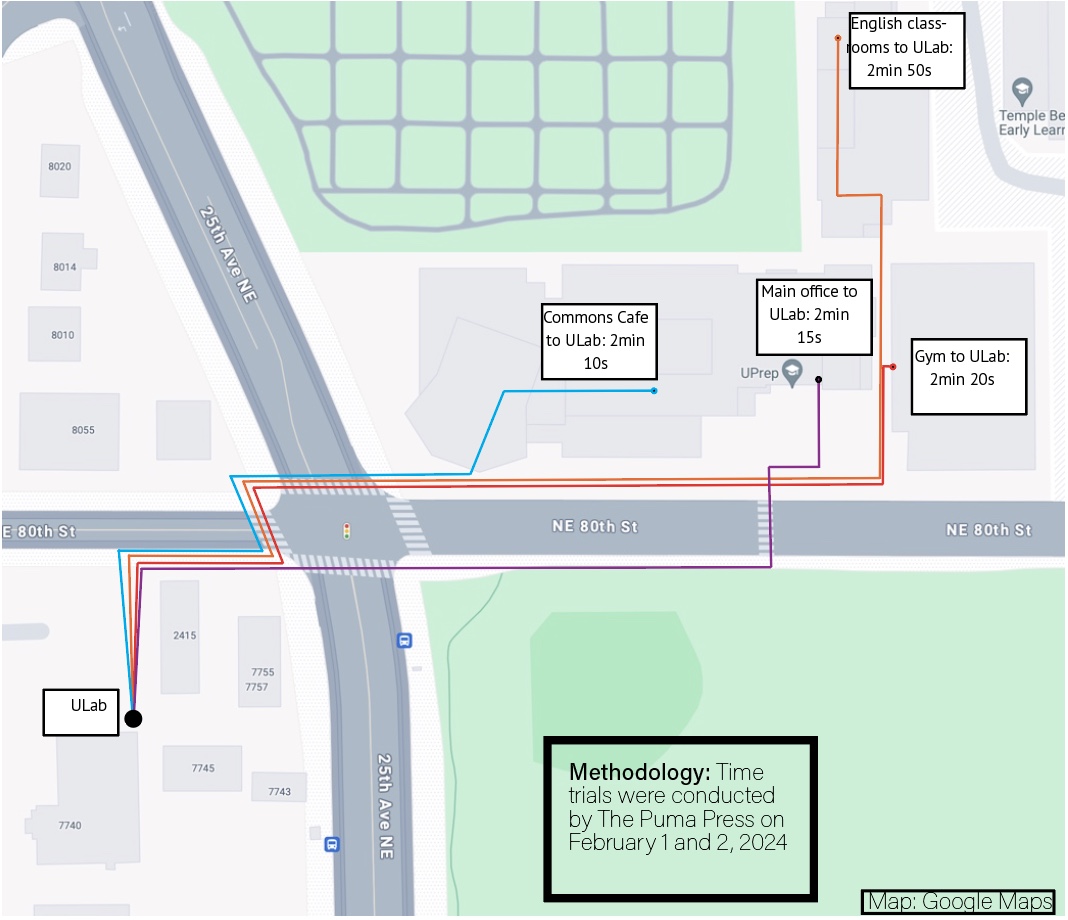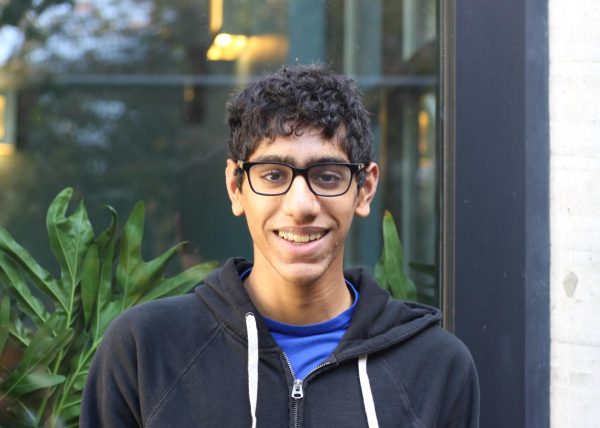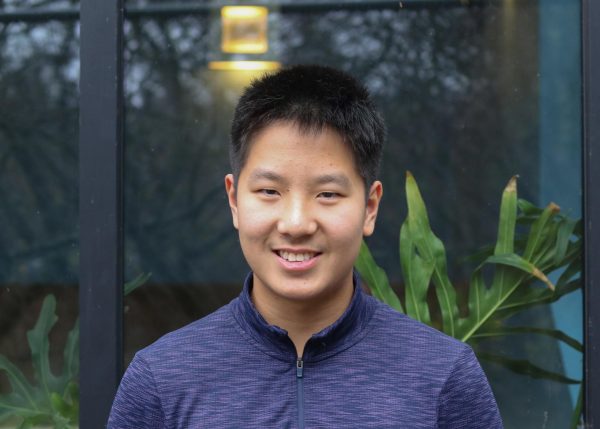The ULab, a brand new, 40,000-square-foot building, has generated concerns among students and faculty. To reach the building, students must cross the busy intersection of 25th Avenue and 80th Street, which poses safety risks. Additionally, needing to cross a street has produced problems for students, as walking from the main campus to the ULab takes a considerable amount of time.
One safety risk is that students traverse the street within the last few seconds of the crossing lights, which poses a danger to both themselves and turning cars.
“There are many students who are looking at the countdown and trying to race across during the three-two-one period,” Director of Facilities Robert Thom said. “What most of them don’t understand is that other vehicles are trying to either turn left or right. And if you start running across, the car may not see a person trying to scatter across.”
Director of Upper School Susie Wu, who serves as a crossing guard at the intersection, has also witnessed many instances of jaywalking, including the rare diagonal cross.
“I have seen [students] dashing across when you’ve got seconds left before the light changes,” Wu said. “The diagonal cross, I did see one time, and I’ve heard that that’s been happening more. [It] concerns me quite a bit.”
Not only is the diagonal cross frowned upon by administrators such as Wu, but it also poses legal issues.
According to Washington state law, “No pedestrian or personal delivery device shall cross a roadway intersection diagonally unless authorized by official traffic-control devices.”
One of the main reasons students have been jaywalking is that they do not want to arrive late to class, since walking from the main campus to the ULab takes, on average, three minutes, according to time trials conducted by The Puma Press.
“I feel like if you are held back two minutes from class to like clean up after yourself or whatever, you should just get a pass from your teacher,” sophomore Keston Gruhl said. “Getting from one end of the building to the ULab is like five minutes. It’s okay, as long as teachers are not marking you late for being a couple of minutes.”
Wu says that passing periods are not the primary cause of jaywalking.
“I think it’s not as much of the five-minute passing period as it is teachers letting out the students right on time or alittle bit late,” Wu said.
Sophomo re Jerryl Tong also believes that the passing periods are of adequate length and should not be elongated because they cut into class time.
“You already have five minutes less of each class, and there are four classes only,” Tong said.
As classes are being held in thenew building, tardy students must walk back to the main campus to obtain a late slip.
“I’ve seen a couple of kids who walk out of the ULab to get a late slip,” Gruhl said. “They have to go to the main office, get the slip, and walk all the way to the ULab for the class, which honestly sounds terrible.”
According to Wu, logistical constraints have made it difficult to have a secondary office to house late slips.
“The tardy slips are still housed in the main office; right now there is one place so we don’t have two different check-in places,” Wu said.
To combat the problem of jaywalking, the school has appointed faculty and staff to act as crossing guards before and after school.
“We’ve instituted putting at least two individuals at the crosswalk to make sure that automobiles are driving safely,” Thom said. “There’s a presence out there so that people [crossing] know that we’re looking.”
The increase in crossing guards stationed at each crosswalk on 25th Avenue has helped deter Tong from jaywalking.
“I definitely would not [jaywalk] across the main street without them saying something,” Tong said.
Wu has also seen success with this strategy but the school is still searching for long-term solutions that will help change student crossing habits.

“It seems like when there’s enough adult supervision out there at key times, that prevents people from jaywalking,” Wu said. “I think the problem that we’re facing is how do we man that intersection until the culture changes.”
Administrators such as Wu and Assistant Head of School for Finance and Operations Susan Lansverk have worked with the Seattle Department of Transportation to lengthen the crossing time going east to west across the intersection. In addition, the time between cycles was also reduced so that the crossing signals would change more frequently.
“[We] also worked with the department of transportation, to change the timing of the lights so that the lights would change faster,” Wu said.
The shorter lights have generated more traffic backups around UPrep, stirring up frustration among drivers.
“During day one of the ULab, after the lights had been put in, we noticed that a lot of the cars were backed up out in front of UPrep itself, which was not allowing enough cars to flow through. So drivers were getting very, very frustrated,” Thom said.
Even among the various traffic concerns, Wu has seen that the shorter traffic lights have helped students cross the street faster.
“Whenever I’ve been at the intersection when students arrive, they don’t wait very long before they have to cross
the street. I think that’s a great change,” Wu said.
In the future, Thom believes that stationing a crossing guard at the intersection could potentially be a long-term solution to jaywalking, but he expresses reservations about its efficacy.
“I don’t know putting somebody out there all day would make the students understand that, hey, you can’t just cross whenever you want,” Thom said. “But, that could be a long-term solution which is to put somebody at the corner, from the opening of school to the closing of school to make sure it doesn’t happen.”





